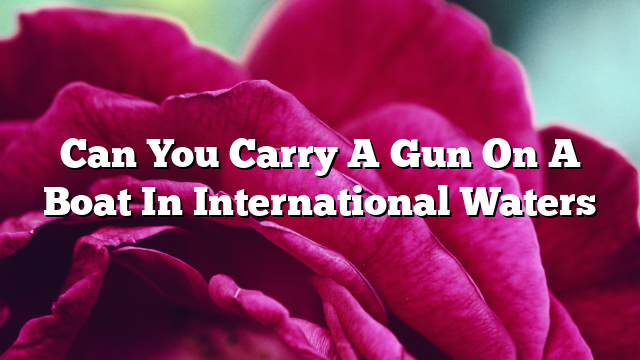In a world where laws and regulations vary from one country to another, navigating the legalities of carrying a firearm on a boat in international waters can be a murky subject. As the vast expanse of the open sea seems to transcend national borders, it raises the question: can you carry a gun on a boat in international waters? This inquiry delves into the intersection of maritime law, national regulations, and individual rights, prompting us to explore the fascinating intricacies of this topic.
International waters, defined as the vast areas of the ocean that fall outside the jurisdiction of any particular country, seem to offer a sense of freedom and autonomy. Yet, the reality is far more complex. While the high seas may represent a realm beyond national control, the vessels that traverse these waters are subject to a patchwork of national laws, international treaties, and maritime conventions. Consequently, the legality of carrying a gun on a boat in international waters is a multifaceted issue that requires us to navigate through a labyrinth of legal frameworks and consider the potential implications for safety, security, and international cooperation. Join me as we dive deep into the legal nuances and explore the various perspectives surrounding this intriguing topic.
In international waters, the laws regarding carrying firearms on a boat vary depending on the country of the vessel’s registration. It is essential to research and comply with the laws of the flag state. Additionally, you should consider the laws of the countries you may encounter during your journey, as they may have strict regulations regarding firearms. Always consult legal professionals and authorities for accurate and up-to-date information.
Can You Carry a Gun on a Boat in International Waters?
When it comes to carrying firearms on a boat in international waters, the regulations can be complex and vary from country to country. It is crucial to understand the legalities involved to ensure you comply with the laws of the jurisdiction you are in. This article will provide you with a step-by-step guide on how to navigate the rules and regulations surrounding carrying a gun on a boat in international waters.
1. Research the Laws and Regulations
The first step in understanding whether you can carry a gun on a boat in international waters is to research the laws and regulations of the countries you will be sailing through. Each country has its own set of rules regarding firearms, and ignorance of these laws is not a valid defense. Start by contacting the embassies or consulates of the countries you plan to visit to obtain accurate and up-to-date information.
Additionally, consult with a maritime lawyer who specializes in international maritime law. They can provide valuable advice and guidance based on their expertise and experience in dealing with the legalities surrounding firearms on boats in international waters.
2. Obtain the Necessary Licenses and Permits
Once you have a clear understanding of the laws and regulations, the next step is to obtain the necessary licenses and permits required to carry a gun on a boat. Some countries may have strict requirements, while others may prohibit firearms altogether.
Contact the relevant authorities in each country to inquire about the specific licenses and permits you need. These authorities could include the coast guard, customs and border protection agencies, or local law enforcement. Be prepared to provide detailed information about the firearm, including its make, model, and serial number.
3. Secure Proper Storage and Safety Measures
When carrying a gun on a boat in international waters, it is essential to ensure proper storage and safety measures are in place. This not only ensures compliance with regulations but also promotes the safety of everyone on board.
Invest in a high-quality gun safe or lockbox specifically designed for maritime use. These safes are built to withstand the harsh marine environment and prevent unauthorized access to the firearm. Additionally, consider implementing additional safety measures such as trigger locks and storing ammunition separately.
4. Comply with Reporting and Declaration Requirements
Many countries require boats entering their waters to declare any firearms on board. Failure to comply with reporting and declaration requirements can result in serious consequences, including fines, confiscation of the firearm, or even imprisonment.
Before entering a country’s waters, familiarize yourself with their reporting and declaration procedures. Ensure you have all the necessary documentation, such as copies of licenses and permits, readily available for inspection by authorities. It is advisable to keep these documents in a waterproof and easily accessible location.
5. Be Mindful of Port Restrictions
Even if you are legally allowed to carry a gun on a boat in international waters, some ports may have additional restrictions or prohibitions. Research the specific regulations of each port you plan to visit and adhere to them accordingly.
Some ports may require you to surrender your firearms temporarily, while others may insist on a bonded storage facility. It is crucial to plan ahead and make appropriate arrangements to ensure compliance with port restrictions without compromising the safety and security of your firearm.
6. Continuous Monitoring of Changing Regulations
Lastly, it is important to note that laws and regulations regarding firearms on boats in international waters can change. Stay informed and continuously monitor any updates or changes in the countries you plan to visit.
Subscribe to reliable sources of information, such as government websites or maritime law associations, to receive timely updates. Being aware of any modifications to the regulations will help you stay compliant and avoid any legal issues while navigating international waters.
Frequently Asked Questions
Can You Carry a Gun on a Boat in International Waters?
International laws regarding carrying firearms on boats in international waters can be complex and vary depending on the country’s jurisdiction and the specific circumstances. It is crucial to understand and comply with the laws of the flag state of the vessel, as well as the laws of any countries the boat may enter or pass through during its journey. Below are some commonly asked questions and answers about carrying a gun on a boat in international waters:
1. Is it legal to carry a gun on a boat in international waters?
The legality of carrying a gun on a boat in international waters depends on various factors, including the flag state’s laws and the laws of the countries the boat enters or passes through. Some countries may allow the possession of firearms on vessels, while others may strictly prohibit it. It is essential to research and understand the laws of the relevant countries before embarking on a journey.
However, even if carrying a gun is legally permitted, it is crucial to consider the potential risks and challenges. International waters are subject to maritime laws and regulations that may differ from those on land. Additionally, the presence of firearms onboard can complicate entry procedures, increase the risk of theft or piracy, and may lead to unintended consequences if not properly managed.
2. Do I need any permits or licenses to carry a gun on a boat in international waters?
The requirement for permits or licenses to carry a gun on a boat in international waters depends on the flag state of the vessel and the laws of the countries being visited. Some flag states may require specific permits or licenses for firearms onboard, while others may not. It is essential to research and comply with the specific legal requirements of the flag state and any countries the boat will enter or pass through.
Furthermore, even if permits or licenses are not required, it is advisable to consider obtaining relevant certifications, such as firearms safety training or a concealed carry license, to ensure responsible and lawful handling of firearms on board.
3. Can I bring a gun on a boat for self-defense in international waters?
The regulations and laws regarding the use of firearms for self-defense on a boat in international waters vary among countries. While some countries may allow firearms for self-defense purposes, others may strictly prohibit it. It is essential to thoroughly research and understand the laws of the flag state and any countries being visited or passed through.
However, it is important to note that the decision to carry a gun for self-defense should be carefully considered. International waters can present unique challenges, such as jurisdictional uncertainties and the risk of piracy. Engaging in armed conflicts at sea can have severe legal and safety implications, and alternative measures such as security protocols, non-lethal deterrents, and professional security personnel may be more appropriate and lawful in many cases.
4. What are the potential consequences of carrying a gun on a boat in international waters?
The consequences of carrying a gun on a boat in international waters without proper authorization or in violation of applicable laws can be severe. Depending on the circumstances and the countries involved, the consequences may include legal penalties, confiscation of firearms, detention, fines, or even imprisonment.
Additionally, carrying firearms can attract unwanted attention, increase the risk of theft or piracy, and potentially escalate conflicts or misunderstandings during interactions with authorities or other vessels. It is crucial to thoroughly research and comply with the laws of the flag state and any countries being visited or passed through to mitigate these risks.
5. What are some alternatives to carrying firearms for personal safety on a boat in international waters?
Considering the potential risks and legal complexities, there are various alternative measures for ensuring personal safety on a boat in international waters. These measures may include:
– Implementing comprehensive security protocols, such as conducting risk assessments, improving physical security measures, and establishing communication and emergency response procedures.
– Hiring professional security personnel with appropriate training and experience in maritime environments.
– Utilizing non-lethal deterrents, such as high-intensity lights, acoustic devices, or water cannons, which can help deter potential threats without the risks associated with firearms.
– Following recommended best practices for navigation and route planning to avoid high-risk areas and minimize exposure to potential security threats.
It is crucial to consult with maritime security experts and adhere to applicable laws and regulations to ensure the safety and security of all individuals on board.
In conclusion, the question of whether one can carry a gun on a boat in international waters is a complex and multifaceted issue. While different countries have varying laws and regulations regarding firearms, international waters are generally subject to the jurisdiction of the flag state of the vessel. This means that the laws of the country where the boat is registered will usually apply.
However, it is crucial for individuals to research and familiarize themselves with the specific laws of the flag state and the countries they plan to visit while on the boat. Additionally, the laws and regulations surrounding firearms can change over time, further emphasizing the importance of staying informed and up to date.
Ultimately, the decision to carry a gun on a boat in international waters should be approached with caution and careful consideration. It is advisable to consult with legal professionals and authorities to ensure compliance with applicable laws and regulations. By doing so, individuals can better navigate the complexities of this topic and ensure their safety and adherence to the law while enjoying their time on the open seas.

















